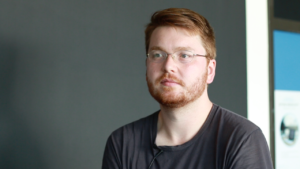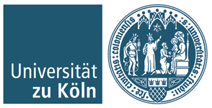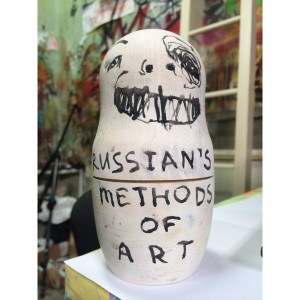The aim and goal of art, I feel there is no one answer to that. It’s just a natural human impulse and it’s kind of like any communication, or any discipline. I don’t know that I could define it, or I can only describe a little of it. I don’t know what the boundaries would be, it’s a trick question.
I think that it’s really interesting to see artists who are working with privacy and security and drones and cyber technologies in a way that kind of shows like, here is potentials these are what’s out there, this is what’s legal now, and we should address this and its not hypothetical, it’s something you can now understand cause it’s being delivered in a smaller, more saturated package.
I think it does provide a service in that sense but I think it’s… I don’t know, I mean, I benefit from artists as much as people benefit from my work. I mean, I benefit much more from the whole body of the earth’s artists then they do from me. I mean I can see it from both sides, as the content producer and also someone who interacts with it and engages with it, with works so, I feel like when it does, I mean it is, it isn’t status quo and it isn’t comfortable, but I feel like that’s part of the larger human desire to explore and understand ourselves but I don’t think that any one artist could handle all of that but we just provide, I don’t know, entry points. So it’s too complex of a question to have one person even give an answer to. It’s the same thing with science, like why try to understand things, why try to develop any product? We should be satisfied with what we have.
A lot of technology… like I was sitting on a panel that was talking about cybernetic implants and things like that and the role of brain-computer-interfaces and a lot of the audience members were discussing this from the point of view of like this theoretical possibility that we should stop now, but I’m introducing it as a concept that’s been around for decades, and that it’s something that does exist and that knowledge of it will help you control the misinformation and it will also help you control the direction that this technology ends up. I think that’s especially important with things like prism and things that came out with Edward Snowden and about the role of technology that’s not being, like the public isn’t informed about, and I think it’s important that you understand what control you can have as a citizen.
I think that’s part of the responsibility at least in working with new media’s or working with technology and art is to be able to say to the public, like these exist and we can have the same rights and privacy applied to these technologies. So, art plays an important role in that in order to bridge that knowledge barrier and also to empower the user to be able to say, we should have this privacy.
The goal of my work is be reabsorbed into something larger. That my work will add something meaningful that someone else can use and take away. At a certain point you are generating content and there is a responsibility with that, you can’t just say, „Oh well I’ve released this to the public“ because especially with anything digital, it’s timeless and there is no past or present, it’s just always present when someone sees it for the first time. So there is a different sense of responsibility that comes with when you produce something and it’s hard to create more, or add on to it, or have it developed because it’s this constant continuum of presentness.

















